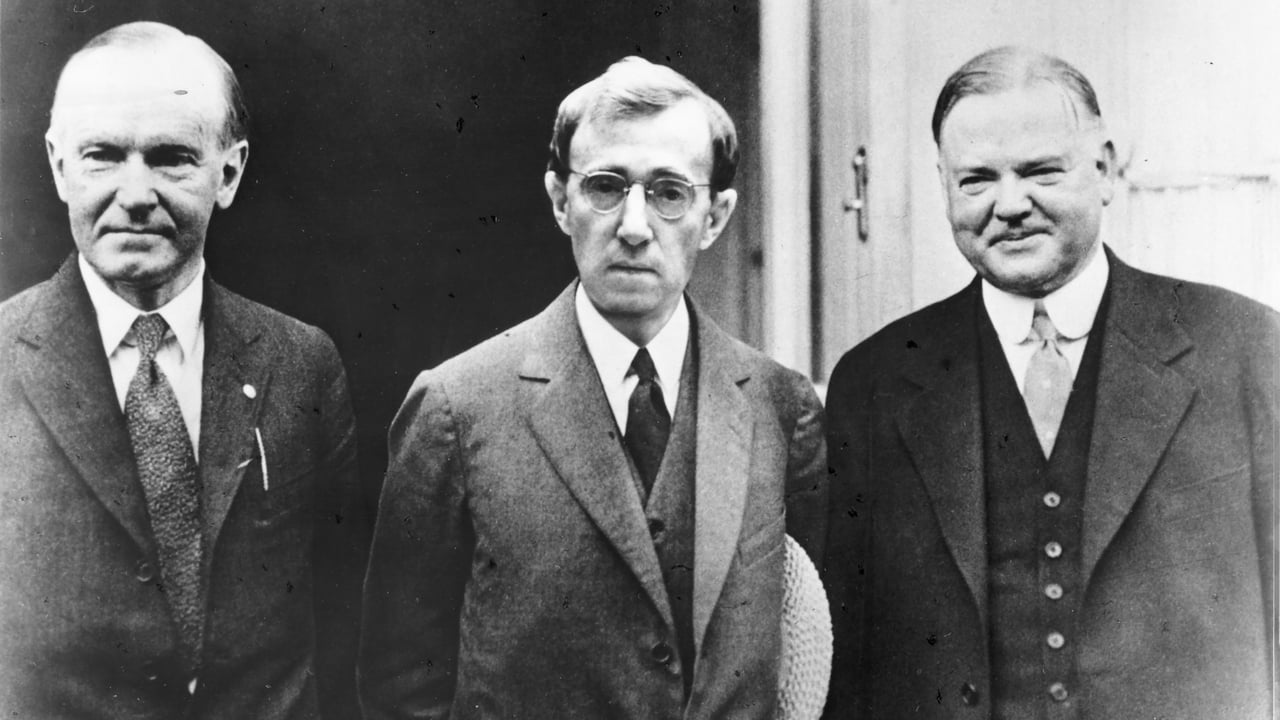

The story of Leonard Zelig, a man who could (and would) assume the physical characteristics and mannerisms of anyone he cam into contact with. When doctors discover him, they try to figure our he has this ability and what causes him to change. Eventually he is treated by Doctor Eudora Fletcher, a psychiatrist, and she works out how to treat him. Meanwhile, dubbed "the human chameleon", he becomes a celebrity. Celebrity has its downsides, however...Very original film from master writer-director Woody Allen. The 1980s were a very creative period for Allen, including venturing into more dramatic areas. Long gone were the absurdist (yet very funny) comedies of the early 70s. Zelig is a bit of a throwback to that period, with a wonderfully ridiculous central plot and some hilarious jokes.While over-the-top, the plot is actually very plausible doesn't fall apart, remaining solid to the end. Being presented as a documentary helps the plausibility. Reveling in its absurdity the movie has a great momentum and energy. The documentary format presents Allen with scores of opportunities to demonstrate his editing and cinematographic skills, editing Zelig (ie himself) into newsreels with famous people as well as constructing very plausible "footage" of Zelig at famous events.One of Woody Allen's greatest movies, and that says a lot.
... View MoreLike Allen's earlier Take the Money and Run, which was one of the first ever mockumentaries, Zelig has a whimsical perspective on life. The distanced, self-serious retrospective that the faux-documentary style comes with therefore is a great match for Allen's comic sensibilities. In Zelig, he engages with the many facets of the eponymous Leonard Zelig's identity, and takes aim at even the most prominent of targets, namely the Catholic Church and Hitler's Nazi party, without ever seeming like slowing down. Of course, although the format presents itself as informative and possessing great insight, it is anything but. Zelig's conditions allows Allen the openest of conveniences to slot himself in any historical moment he pleases without the slightest hint of illogic or absurdity. Well, perhaps less the latter, but Allen is smart enough to not over-do any of his gags, or to draw too much attention to them. Sneaking into Hitler's elite seamlessly and then suddenly wondering and waving about as if he has no idea why he is there could be such an easy and tasteless joke to make, but here it is played completely straight. The narrators address the event with such concern and serious regard (even a former SS Obergruppenfuhrer grumpily recalls the scenes) and Hitler was reportedly "extremely upset". Mild, and at the same time, a hilarious image is formed. It is nothing at all like what happened in the film adaptation of the fateful meeting. Allen is particularly fond of these deconstructions within his work: see The Purple Rose of Cairo for an entire film on this treatment. Partly why this approach is so believable and successful is because of the technical lengths and achievements that went into integrating the bluescreen footage into the various archival scenes. Fervent critics of Allen might accuse his ego of taking over his films, making himself the centre stage of all the events - imagine if Allen had been as explicit as Forrest Gump. But what makes Zelig work is precisely the opposite; his knack for blending into a scenario like a chameleon renders the thin, pasty face of Allen (and there is no spotting that red hair) almost unrecognisable, and the delight is in how long we can accept a scene for what it is before we suddenly realise where he is. Long- time collaborator Gordon Willis has done a brilliant job of this - the filters, the grain, the decay of the negatives, it all looks authentic. This allows Allen to play with the format in his own way, slip in jokes that would be much less effective overtly. My favourite is the solemn voice-over concerning Zelig's overconfidence which leads him to adamantly disagree with other's opinions. The elderly Fletcher narrates this as some grave medical condition, and all the way during, we see Zelig get comedically violent with a rake with the group of doctors. The exaggerated, slapstick movements are nevertheless visible in the film grain. There is another subversion of the format; Fletcher uses hypnosis in order to draw out intensely personal confessions from the childhood of Zelig (Allen has always had an intense fascination with psychoanalysis). He drones off with the usual beginnings ("My brother beat me" "I just want to fit in") and then trails off in awkwardly hilarious monologues about cheap rabbis and the terrible quality of Fletcher's pancakes (at which point Farrow, red-faced, tries to look away into the distance even though Zelig is not even aware of her). Take the Money and Run was funny enough, but the humour was a little disjointed, and a lot of the jokes felt like leftover bits that Allen wanted to no go to waste. This, on a whole, is more sophisticated and integrated, and knows exactly how to use the mockumentary format to its advantage.
... View MoreThis could well be a review of 90% of Woody Allen's oeuvre. The film is a smorgasbord of fabulousness - exquisite concepts, very clever lines and very funny ones. No film maker has ever had such a grasp of irony, sarcasm and the ridiculous, and still imbue it with wit and (occasionally) subtlety. But it is the relentless self-deprecation and extant feelings of worthlessness that eventually become wearing after you have watched as many Allen films as I have. This is the film that most impresses you with his confusion over identity however. I could go on about self-analysis for pages but it's unnecessary...just watch any given Woody Allen film. He mellows it out with a rather forlorn sense of romance that becomes endearing rather than pathetic...a skill that is essential to engage with his films. This is a fine film. Oh yeah...and very funny...if you get the references.
... View MoreReview: What was Woody Allen on when he was making this film? I must admit, it's shot extremely well and he really looks like he's in some of the old footage, but the storyline is completely bonkers. It's about a human chameleon who seeks treatment for his weird condition. I really wondered what was going on while I was watching the film because it looked so real. The added commentary and interviews also made it seem really realistic but the storyline does go from one extreme to another. Watching Allen's character change into a Jew and a black person was cleverly done for a movie that was made in the 80's, but I was wondering what was Allen trying to attempt. It's shot like a documentary so there isn't much comedy but the concept is original but weird. I did stick with the movie because of the crazy storyline, but I don't know if I liked it or just thought that it was mad. Watchable!Round-Up: Personally I think that this movie would have been much better if he had some top class actors in it. The scene were Zelig was sitting behind Hitler trying to get his wife's attention was impressive and Allen played his character well. When all of his wife's started to pop out of the woodwork, the moral of the story comes into play but it's still a crazy movie. It's worth a watch just to witness Zelig change into different people and to see how he cleverly put the movie together. It does seem like your watching the History channel because of the old footage, but when you see Allen's face pop up in some of the shots, you realise that it's his warped sense of humour that created such a off the wall movie.Budget: N/A Domestic Gross: $12millionI recommend this movie to people who are into there Woody Allen movies about human chameleon, trying to to be cured of his condition. 5/10
... View More